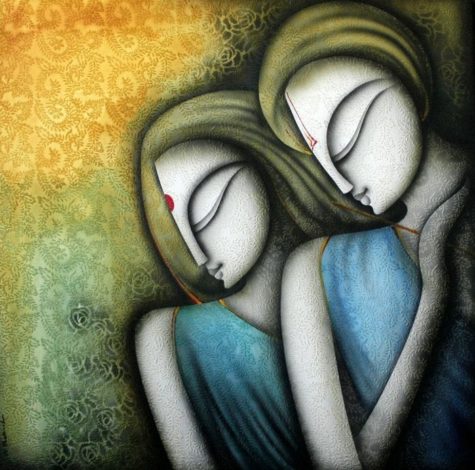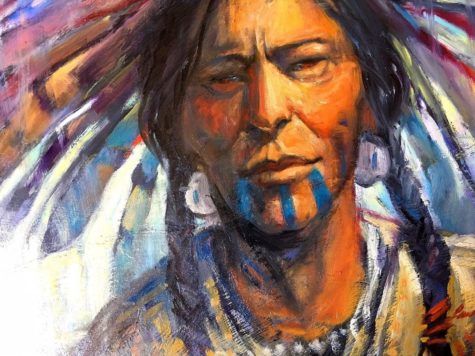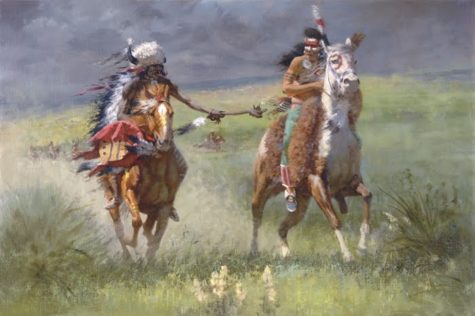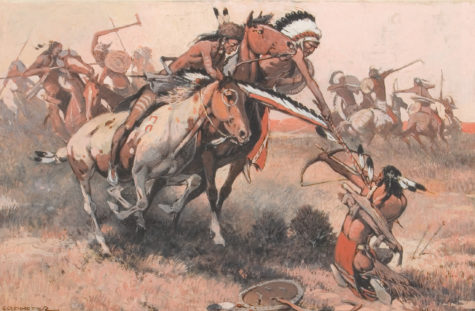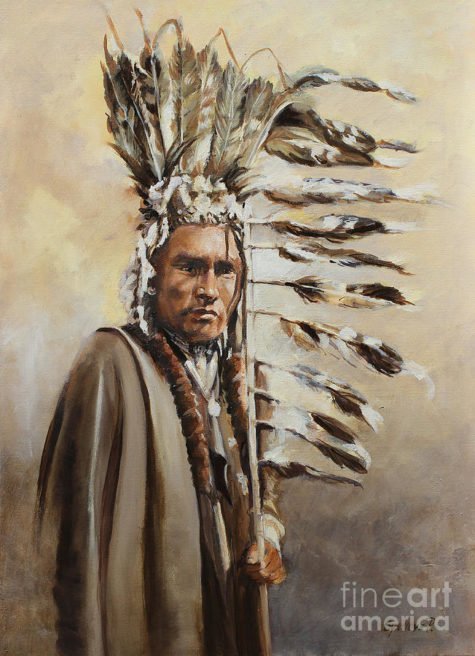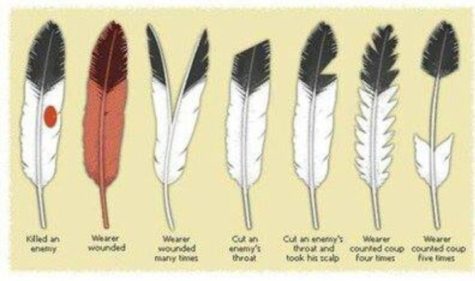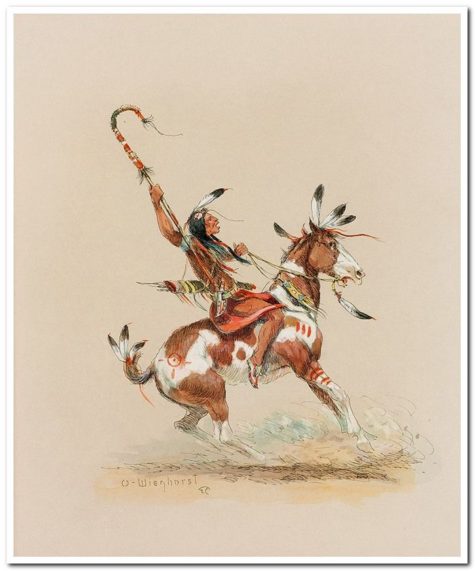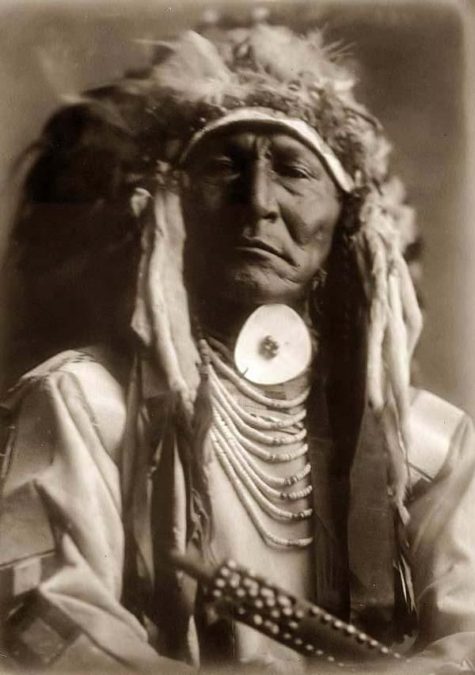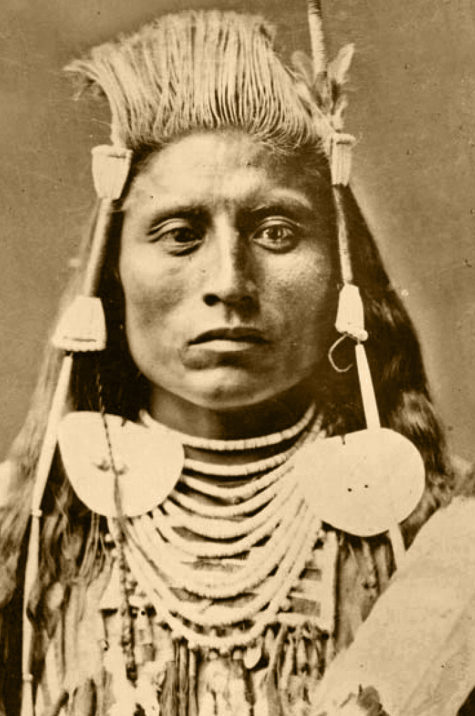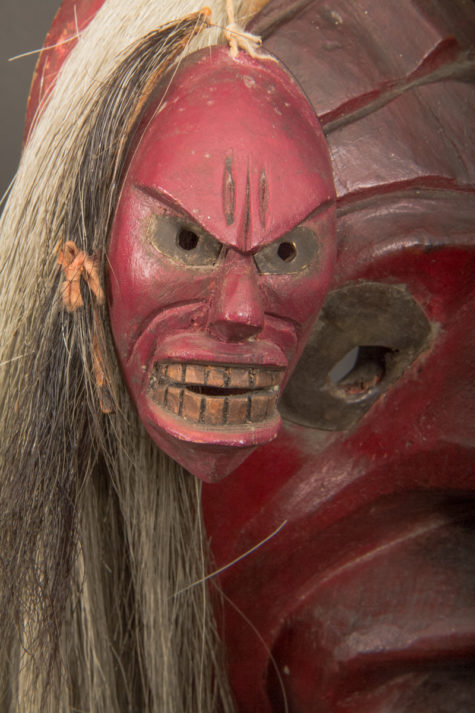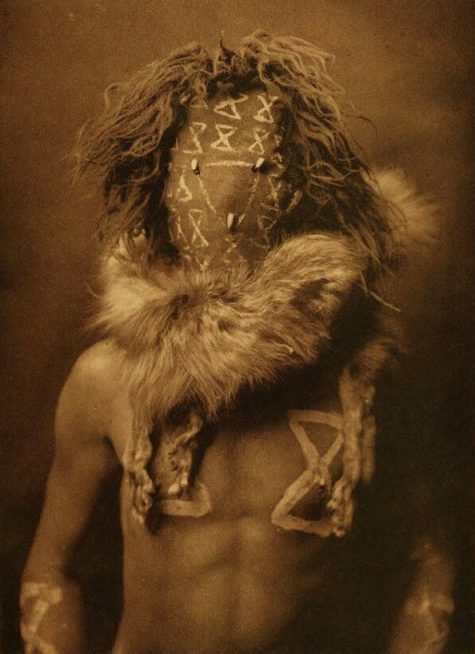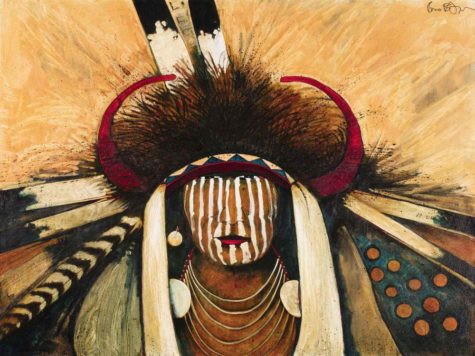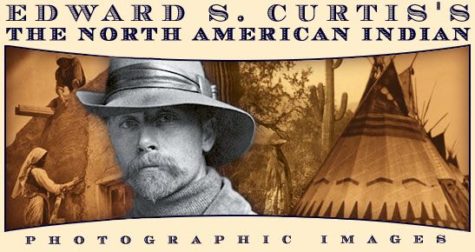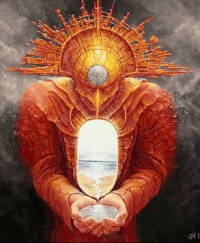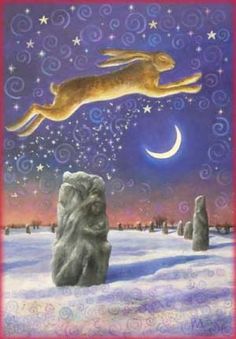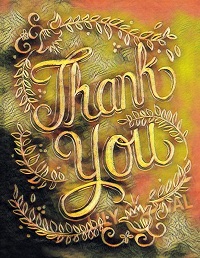The taking of life brings serious thoughts.
We have come thus far, my brothers. We have already laid our plans. With magic power the trail is made easy, bordered with flowers, grass, and trees.
The enemy saw the apparent bounty of nature and assembled, laughing, to gather the seeds and plants. It was the power of the distant magician which made the enemy enjoy his fancied prosperity.
In the center of our council ground the fire burned and, lighting a cigarette, I puffed smoke toward the east. Slowly a vision arose before me …
On the mountain tops was a yellow-spider magician, upon where I called for help. He went to the enemy, darkened their hearts, tied their hands and their bows, and made them grow weak as women.
Then he pushed us on to destroy the enemy. We rushed upon the Apaches and killed them without difficulty.
With gladness in my heart I gathered the evidences of my victory and turned toward home.
You may think this over, my relatives. The taking of life brings serious thoughts of the waste; the celebration of victory may become riotous.
~A Pima Poem
The act of Counting Coup signifies a victory over an enemy or an accepted challenge. The Warrior Clans of Native America used many methods of stealth, guile, surprise, planning, and physical strength to claim prizes from their opponents. The Traditional prizes taken on raids were Horses, Eagle feathers, Medicine Bundles, Medicine Shields, tomahawks, bows, and other weapons. Scalps were not honorable prizes of Counting Coup before the Boat People came to Turtle Island.
Trappers and traders sold scalps to European curiosity seekers saying that the “savages” in the new world cut each other’s scalp off, when, in fact the practice of scalping was started by those who sought money from the wealthy in Europe. As the scalping horror spread and Native women and children were being killed and scalped or scalped alive, the Warrior Clans began to retaliate.
The men of any race or Tribe were of the Warrior Clan in the eyes of Native Americans and were charged with the honor of protecting women and children. It was the highest form of shame for a Warrior to have the women and children under his protection hurt in any way.
Anger and hatred began to grow on all sides, Tribe against Tribe and Indian against white. The act of Counting Coup had been soiled and the honor normally between Warriors and soldiers had been cast aside. In the original meaning, Counting Coup had been an act of victory. A Warrior would steal something from the Brave he had bested to show how strong his Medicine was against his rivals.
This practice varied among Tribes. Members of the Warrior Clan among the Plains Indians often had a Coup Staff or Stick, much like a shepherd’s crook that was placed inside his lodge and carried the reminders of his personal victories. The Coup Staff had various prizes tied to it. These objects could include Horse hair (if he had stolen the mount of another Warrior), Eagle feathers, a piece of material, beads, or a Medicine Pouch, which had been tied to the mane of an opponents Horse. Later with the practice of scalping, a scalp could also be seen hanging from a Coup Stick.
In marking a victory, there were certain things that a Brave was then allowed to do that would tell others of his Counting Coup. He could use the designs in his face paint which added honor to his status and told those who knew how to read its meaning that he had one or more acts of bravery added to his name. These symbols could also be added to his Horse’s warpaint when he rode into battle again. The more Coups Counted, the stronger the Medicine of that Warrior.
Four to six major types of Coups were Counted among the Sioux, the Crow, the Blackfoot, the Apache, the Cherokee, the Cheyenne, the Kiowa, the Flathead, the Ute, the Arapahoe, the Pawnee, the Shoshone, and others.
- The first in importance was to strike an enemy with bow and arrow, tomahawk, or later a rifle’s bullet.
- Another important Coup was “riding the enemy down.” To ride an enemy down was to knock the Warrior off his Horse and finish him off with hand-to-hand combat.
- To steal an enemy’s Horse was another important Coup. Stealing Horses was to steal the means of retaliation, and therefore, steal Warrior-power, or strength.
- The fifth was to steal some of the enemy’s Medicine, which could be his Shield, his Eagle feathers, his Medicine pouch, a beaded medallion, a Buffalo-bone chestplate, or scalplock.
A scalplock is one tiny piece of hair that is braided with some kind of Medicine representing that person’s Allies, connections, or strengths. A scalplock can have a strip of hide, a feather, a tooth, beads, and/or other small objects tied to it. To cut the braided scalplock from a Warrior’s hair was to strip him of his war medicine.
- The final recognized form of Counting Coup was to destroy a Warrior’s Lodge or Tipi, take his woman, or personal possessions. This form of Counting Coup was not as honorable and was used only as a last resort, to humiliate rather than to conquer another Warrior’s Medicine.
Among the Plains Indians, if a death occurred, the raiding party would smear black paint on their faces when returning to camp. The women would start their mourning trills and cries at the first sight of the Black Faces. The grieving family would be relieved from the duties of daily life and work for four days.
The four days of mourning honored the Winds of the Four Directions, which would take the loved one to the Sky Lodge after having “dropped his robe” (dying). If the raid was not victorious, the entire Tribe observed the death with mourning. If the Warriors had Counted Coup, the grieving family was taken care of and waited upon, but the Coup celebration would continue for the other Tribal members.
At the Coup feast, the leader of the war party or raiding band would give those who had witnessed the individual victories of their friends the honor of telling the events. A Warrior was honored by his friends and was not allowed to tell the story himself.
This practice added another dimension to the celebration since a friend’s pride in another Brother’s accomplishments came into play. This insured the participation of those who had not accomplished an act of Coup personally and made them part of the celebration as well. It also ruled out any embellishments on the part of those actually involved.
To speak in an exaggerated manner was considered prideful and to lie was to lose face. A true witness was bound by honor to speak honestly of a Brother’s courage or lack of it.
If someone had shamed the Warrior Clan, it was spoken of in the Council of that Clan and never in front of the entire Tribe. A loss of courage was a blemish on all of the Brothers of the Warrior Clan and since they acted as an elite group or unit, “shame-faces” were not allowed to continue as members.
“To add a Coup Feather to one’s Bonnet” is an expression that comes from the idea of personal achievement or accomplishment that will aid or assist the whole. In the concept of Counting Coup, jealousy and envy have no place. There is no victory when anyone is belittled through the boasting of another. There is no honor in self-importance.
Actions speak louder than words when victory is sought. A Coup Feather is never awarded to someone who intended to do something but did not follow through. Walking One’s Talk is the essence of true victory. As reflected by our Ancestors, the victory of the Coup Feather is based upon the high ideals of Eagle. Those ideals are followed by action. Just as Eagle marks and kills its prey, so must we mark and attack the weaknesses that keep us from fulfilling our words.
As Counting Coup is a personal victory that affects the whole, so is the war we wage on the old patterns that keep us from knowing world peace. These enemies can be ignorance, inner conflict, envy, jealousy, willful pride, laziness, fear, bitterness, hatred, greed, bigotry, gossip, resentment, and broken promises.
Our modern Medicine Shields are made from truth, our weapons are living that truth, and our prize is our future, bringing the healing of Earth Mother’s children. Every Two-legged has been asked to accomplish these Coups through the discovery and healing of the Self.
~Jamie Sams
In my Morning Meditation today, my teacher was a Crow warrior.
When I looked into his eyes, I saw a battlefield, I smelled the blood and the shit. He was holding up a decapitated head. Holding it by it’s hair. It was dripping blood. Other younger warriors were trilling and “counting coup”. It was a dreadful scene.
He looked at me and said:
“Be who you are.
It is very important.”
And when he said that, I realized:
Don’t be who they are, don’t be who others want you to be, don’t be someone else, don’t be who you think you should be. Be you, totally and completely you. No excuses. No regrets. And if you don’t know who you are… well, OK… you can just be “you not knowing you”.
According to Crow tradition, a man must fulfill certain requirements to become chief of the tribe: command a war party successfully, enter an enemy camp at night and steal a horse, wrestle a weapon away from his enemy and touch the first enemy fallen, without killing him. Joe Medicine Crow was the last person to meet that code, though far from the windswept plains where his ancestors conceived it.
During World War II, when he was a scout for the 103rd Infantry in Europe, he strode into battle wearing war paint beneath his uniform and a yellow eagle feather inside his helmet. So armed, he led a mission through German lines to procure ammunition. He helped capture a German village and disarmed — but didn’t kill — an enemy soldier. And, in the minutes before a planned attack, he set off a stampede of 50 horses from a Nazi stable, singing a traditional Crow honor song as he rode away.
Joseph Medicine Crow (October 27, 1913 – April 3, 2016) was a war chief, author and historian of the Crow Nation of Native Americans. His writings on Native American history and reservation culture are considered seminal works, but he is best known for his writings and lectures concerning the Battle of the Little Bighorn in 1876. He received the Bronze Star Medal and the Légion d’honneur for service during World War II, and the Presidential Medal of Freedom in 2009.
He was the last surviving war chief of the Crow Nation, and was the last living Plains Indian war chief. He was a founding member of the Traditional Circle of Indian Elders and Youth.
The False Face Society is the best known of many medicinal societies among the Iroquois. The society is best known for its dramatic wooden masks, the “false faces.” The masks are used in healing rituals which invoke spirits and a dream world. Those cured by the society become members. Also, echoing the significance of dreams to the Iroquois, anyone who dreams that they should be a member of the society may join.
The masks are considered to be living and breathing. They are fed with cornmeal ‘Mush’ and they accept gifts of tobacco as payment for rituals. The design of the masks is somewhat variable, but most share certain features. The masks have long, black, reddish brown, brown, grey or white horse hair. Before the introduction of horses by the Europeans, corn husks and buffalo hair were used. The eyes are deep-set and accented by metal. The noses are bent and crooked. The other facial features are variable. The masks are painted red and black. Most often carry pouches of tobacco on their foreheads and/or nostrils. Basswood is usually used for the masks although other types of wood are sometimes used.
When making a mask, an Iroquois man walks through the woods until he is moved by a spirit to carve a mask from the tree. The spirit inspires the unique elements of the mask’s design and the resulting product represents the spirit itself. The masks are carved directly on the tree and only removed when completed. Masks are painted red if they were begun in the morning or black if they were begun in the afternoon. Red masks are thought to be more powerful. Masks with both colors represent spirits with “divided bodies.
A story about False Face can be found here: The Story of False Face
So, today my morning meditation was interesting!
I opened the book and a Navajo medicine man wearing a strange mask looked at me and immediately yelled “Muhaha!!” Well, he didn’t yell that exact word, I can’t describe the sound he actually made, but it scared all the evil spirits right out of me.
It was very invigorating! And I really did feel quite a bit better for it.
The story of False Face as told by Mad Bear Anderson.
I will tell you his story – who he is and how he came to look like that. But he is gone on now, evolved beyond this. These Beings have graduated and gone to a higher world – and they are high, high, high, beyond us. Yet we keep the False Face in this form and we pay honor and respect to it. It reminds us of a lesson far ahead of us – a hard lesson that we have yet to learn.
I call him False face even though that wasn’t his name at his time. That was never the name of him or his people but that is how we refer to it. False Face had studied and learned all the basic things in the universe. Then he had prepared and developed himself in all the medicine ways. It took centuries of hard work, but eventually he developed all the spiritual powers known on this Earth. He knew all the ways of the Creator.
One day False Face stood out in a large field looking at the skies and at the mountains in the distance. And he thought to himself: Knowing as I do all the ways of the Creator, all things in this world are possible for me. I now understand how all things are done. Why, if it should be my will, those mountains should have to move.
And then he heard the voice of the Creator whom he knew as the Great Lord of the Universe. The voice said, “Yes, I am the Lord and the mountains are there by my will.”
False face paused for a moment. Many times he had heard the voice of the Creator; but now he was thinking only of himself. Speaking aloud, he announced in a powerful voice, “I have come to know the ways of the Lord and I can duplicate them all! I can move these mountains if I wish!”
And the Creator repeated, “Yes, I am the Lord and I can move mountains.”
“Not you!” shouted False Face. “I am referring to myself, I am talking about me. Have I developed all this for nothing? Can I do nothing myself? I have learned all the rules of power and creation! Do you still think I am useless without you?”
“You are never without me,” the Great Spirit answered in a gentle voice, “for I am always with you.”
“But I know all your secrets now,” False Face protested. “I know how you do all these things.”
“It is because you have come to me,” said the Great Spirit.
In spite of all that he had learned, in spite of all his training and wisdom, False Face experienced a rush of great pride and anger, and he shouted at the Creator. “Go away. Leave me alone. I don’t need you anymore. I am now powerful and you want to think of me as your little child. I am not your little child anymore. I can do anything that you can do. So just leave me alone.”
“Alone?” said the Great Spirit. “There is no alone. How can I leave you? We are one and cannot be apart.”
These gentle, loving words only made False Face more angry. It seemed to him, in his anger, that the Lord was discrediting him in spite of all his long efforts and the remarkable knowledge and power that he had attained. It seemed to him that the Great Spirit was still claiming all power for himself.
In his angry state, False Face determined to have a contest with the Lord of the Universe and he challenged Him. “I know you don’t want these mountains moved, Lord. But I am going to move them against your will. Then you will see that I am something in my own right. You can pit your power against me if you wish, Lord!”
“I do not pit anything against anything,” answered the Lord. “This idea of a contest is a temporary dream. Wake up and come to me now and you will see that nothing is anything in its own right apart from all that is.”
But False Face repeated his challenge, “You are trying to take everything away from me, Lord. You cannot take this chance away. Do what you like. Oppose me if you like, but I am going to move these mountains anyway, knowing that you want them where they are, so that it will be clear that it is done by my will alone.”
False face waited there in the field, grim and determined, and there was nothing but silence. So he went about the contest. Though he strained with all his might, trying everything that he had learned and developed over the centuries, nothing happened. Nothing at all. There was only a soft breeze, and the mountains stood in the distance as always. he flew into a rage, cursing in a way that cannot be repeated and, when there was only silence, daring the Lord to respond. He called the Great Spirit a fake and a liar, claiming the Creator had pitted his Great Will against him in spite of promising he would not.
Then an idea occurred to him. He would have his contest yet. He shouted at the Lord, daring the Lord to move the mountain while he tried to block Him with his own will as the Lord had done to him. He believed that if the Lord had neutralized his power then he could do the same to Him. But he also believed that the Lord might well want the mountains where they were and would be unwilling to move them. In either case, nothing would happen. He craved to claim victory over the Lord and he felt sure he would win his dare.
He shouted his challenge again. He clenched his fists and squinted his eyes and screamed into the sky; and before he could finish his sentence, he heard a trembling and a rumbling. He spun around to look just as the mountain was coming to his side. That was a mistake, for that caused the mountain to strike his face and break his nose.
And at that the gentle voice of the Great Spirit was heard again. “Now look what we have done to our beloved self. No matter. It is very temporary. We shall now set it right with our collective will, shall we?”
False Face felt a moment of great pain, and then he had a sudden awareness. There was no contest. There had never been any contest. This was another of his countless lessons. But this was the ultimate lesson and he had arranged it – he and His Own Self – so that he could be free from the desire to be a separate, independent something in its own right. So that he could be free from being apart and alone.
-oOo-
Mad Bear went on to say:
“Just think what we have to look forward to. After all our learning and development, we are still going to come to that last great contest – that last big hurdle for the powerful ego. Isn’t that something? But once you have made that last hurdle, that’s it. Then you graduate and go on to a higher level. “
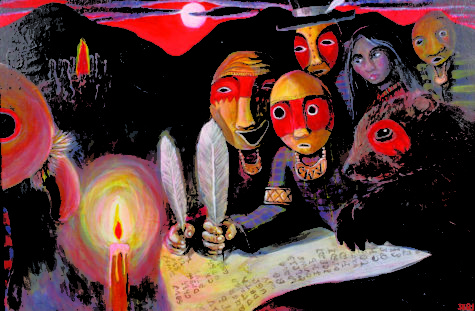
For months now, I’ve been talking about needing to find a “teacher,” someone to teach me about magick, shamanism, healing, spirituality, life, living, and all those things that I am so intent on knowing. Finally, one day I suggested to my friend Daniel that maybe I should just make an appointment and show up and wait… like for example, I could tell the Master of the Universe that I could be found every Sunday at 2 pm sitting in the coffee shop at Borders in Lee’s Summit, and to please send my teacher there to find me.
God often speaks to me through books, and I figured that if no one showed up, maybe I’d at least find a book or a CD, and if all else fails, I will have enjoyed a good cup of coffee.
However… always there’s the buts and the howevers… it never seemed really practical or possible to commit to being in town at a specific place at a specific time on one of my days off, and I for sure wouldn’t be able to commit for the days that I work. So… the idea just sat there… unattended and well… fermenting.
Then, when I was in Texas, my sister and I visited Barnes and Noble and I found a really cool book on the bargain table. The North American Indian by Edward S Curtis.
I opened it up and flipped through the pages, and stopped, riveted by the image of this most amazing person. He looked right into me. I could hear… yes, really… I could hear him chanting Lakota prayers… almost I could smell the sage… and the warm red earth… the feathers and the skins and the people around me… almost.
It was like a revelation. Here was my teacher… here were my teachers… I would take that book home, and every day as part of my morning meditation, I would open the book at random, meet with my teacher, and listen, and learn. Cool huh?
Blessings from my heart to your eyes!
Enjoy!
